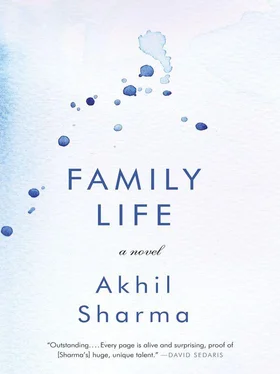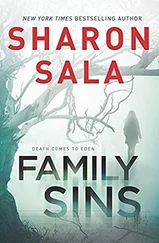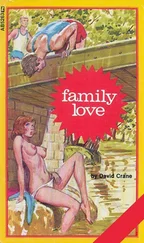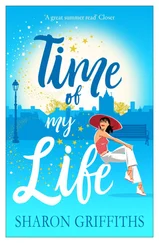I wanted to take out ten picture books.
My father said, “You think I’m going to give you money for such small books?”
Along with Birju and me reading, the other thing my father wanted was for Birju to get into a school called the Bronx High School of Science, where the son of one of his colleagues had been accepted.
MY MOTHER, BIRJU, and I had taken everything we could from the airplane: red Air India blankets, pillows with paper pillowcases, headsets, sachets of ketchup, packets of salt and pepper, air-sickness bags. Birju and I slept on mattresses on the living room floor, and we used the blankets until they frayed and tore. Around the time that they did, we started going to school.
At school I sat at the very back of the class, in the row closest to the door. Often I couldn’t understand what my teacher was saying. I had studied English in India, but either my teacher spoke too quickly and used words I didn’t know, or I was so afraid that her words sounded garbled to my ears.
It was strange to be among so many whites. They all looked alike. When a boy came up to me between periods and asked a question, it took me a moment to realize I had spoken to him before.
We had lunch in an asphalt yard surrounded by a high chain-link fence. Wheeled garbage cans were spread around the yard. I was often bullied. Sometimes a little boy would come up to me and tell me that I smelled bad. Then, if I said anything, a bigger boy would appear so suddenly that I couldn’t tell where he had come from. He would knock me down. He’d stand over me, fists clenched, and demand, “You want to fight? You want to fight?”
Sometimes boys surrounded me and shoved me back and forth, keeping me upright as a kind of game.
Often, standing in a corner of the asphalt yard, I would think, There has been a mistake. I am not the sort of boy who is pushed around. I am good at cricket. I am good at marbles.
On Diwali, it was odd to go to school, odd and painful to stand outside the brown brick building waiting for its doors to open. In India, everything would be closed for the festival. All of us children would be home dressed in good clothes — clothes that were too nice to play in, and yet by the afternoon, we would be outside doing just that. Now, in America, standing on the sidewalk, I imagined India, with everyone home for the new year. At that moment, I felt the life I was living in America was not important, that no matter how rich America was, how wonderful it was to have cartoons on TV, only life in India mattered.
One day a blue aerogramme came from one of Birju’s friends, a boy who had not been smart or especially popular. I read the letter and couldn’t understand why this boy got to be in India while I was here.
At school I was so confused that everything felt jumbled. The school was three stories tall, with hallways that looped on themselves and stairways connecting the floors like a giant game of Snakes and Ladders. Not only could I not tell white people apart, but I often got lost trying to find my classroom. I worried how, at the end of the day, I would find the stairway to take me down to the door from which I knew the way home. Within a few months, I became so afraid of getting lost in the vastness of the school that I wouldn’t leave the classroom when I had to use the toilet. I imagined that if I left, I might end up wandering the hallways and not be able to get back to my class. I imagined I would have to stay in the building after school ended, that I would have to spend the night in school.
QUEENS WAS A port of entry for Indians. Indian stores were not specialized then. The same store that sold Red Fort rice also carried saris, also had calculators, blood pressure cuffs, and the sorts of things that people took back to India as gifts. Back then, even in Queens, there were not yet enough Indians for the stores to carry produce. To get bitter gourds and papayas and anything that might spoil, my father went to Chinatown.
In India, to earn blessings, my mother used to prepare extra rotis at every meal to feed the cows that wandered our neighborhood. In America, we went to temple on Fridays to, as my mother said, begin the weekend with a clean mind. Our temple was one of just a few on the Eastern Seaboard. Until recently it had been a church. Inside the large, dim chamber there were idols along three walls and the air smelled of incense, like the incense in temples in India. In India, though, temples also smelled of flowers, of sweat from the crowds, of spoilage from the milk used to bathe the idols. Here, along with the smell of incense, there was only a faint odor of mildew. Because the temple smelled so simple, it seemed fake.
ONE NIGHT, SNOW drifted down from a night sky. I felt like I was in a book or TV show.
FOR ME, THE two best things about America were television and the library. Every Saturday night I watched The Love Boat . I looked at the women in their one-piece bathing suits and their high heels and imagined what it would be like when I was married. I decided that when I was married, I would be very serious, and my silence would lead to misunderstandings between me and my wife. We would have a fight and later make up and kiss. She would be wearing a blue swimsuit as we kissed.
Before we came to America, I had never read a book just to read it. When I began doing so, at first, whatever I read seemed obviously a lie. If a book said a boy walked into a room, I was aware that there was no boy and there was no room. Still, I read so much that often I imagined myself in the book. I imagined being Pinocchio, swallowed by a whale. I wished to be inside a whale with a candle burning on a wooden crate, as in an illustration I had seen. Vanishing into books, I felt held. While at school and walking down the street, there seemed no end to the world, when I read a book or watched The Love Boat , the world felt simple and understandable.
Birju liked America much more than I did. In India, he had not been popular. Here he made friends quickly. He was in seventh grade and his English was better than mine. Also, he was kinder than he used to be in India. In India there had been such competition, so many people offering bribes for their children to get slightly better grades, that he was always on edge. Here doing well seemed as simple as studying.
One of the boys that Birju befriended was an Indian from Trinidad. My mother and Birju talked about him often. My mother wanted Birju to avoid him because the boy did not get good grades. I think she also looked down on him because he was not from India and so was seen as out of caste.
“He thinks a sanitation engineer is an engineer, Mommy,” Birju said, sounding upset, as if his friend’s misunderstanding hurt him. “I told him it was a garbage man.”
My mother was boiling rice at the stove. Birju, I remember, was standing beside her in a tee shirt with brown and yellow horizontal stripes that made him look like a bumblebee.
“Why is that your problem? Why are you going around educating him?”
“He doesn’t have good parents. His mother and father aren’t married. Neither one of them went to college.”
“He’ll drag you down before you save him.”
My school was on the way to Birju’s, so Birju used to walk me there every morning. One morning I started crying and told him about the bullying. He suggested that I talk to the teacher. When I didn’t, he told our parents. My father came to school with me. I had to stand at the front of the class and point at all the boys who had shoved me and threatened me. After this, the bullying stopped. I had been upset that Birju told our parents. I hadn’t thought that what he suggested would make a difference. The fact that it did surprised me.
In India, Birju had collected stamps, and he would sit for hours and look at them. Now, he made model airplanes. He spent whole days at our kitchen table, his mouth open, one hand holding tweezers and the other a magnifying glass.
Читать дальше












